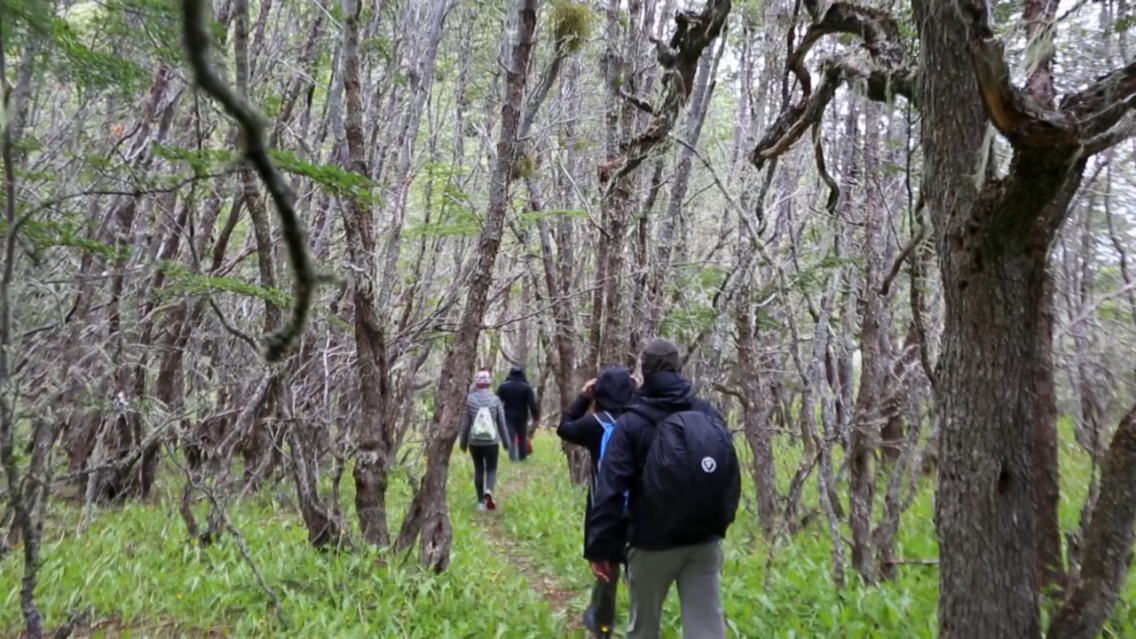Sustainable Study Abroad Grants
Sustainable Study Abroad Grants of up to $500 are available to all students studying abroad through Middlebury College.
Sustainable practices are central to Middlebury’s mission across all its schools and programs.
Grants of up to $500 are available to students studying abroad through Middlebury College. Undergraduates studying at the Middlebury C.V. Starr Schools Abroad, as well as Middlebury students studying abroad on approved externally sponsored programs, are eligible for these grants.
Grants may be used for research projects or participation in events or projects related to sustainability issues; this may include projects or research that look at ways of reducing the human impact on the environment, enhancing social well-being, or economic development that addresses the environment and/or social well-being.
Click here for the application and to see descriptions of past grant projects.
Sustainability Partnerships in Chile
We are in Karukinka. Karukinka is in Southern Chile, in Tierra del Fuego. We’re down here with Middlebury students and the Wildlife Conservation Society to learn about the park, and try to find ways in which we might develop a partnership.
So our journey started in Punta Arenas.
We took a ferry out to Porvenir which is the port town in Tierra del Fuego. And from there, we took we drove all the way down to Vicuna which is the first major town and center of operations in Karukinka. The highway’s called which is the root at the end of world.
So I think it’s pretty safe to say past us, it’s ocean and then Antarctica.
Karukinka’s this unique opportunity that Chile has, that the Wildlife Conservation Society has and that the Middlebury school abroad has to take a very young part and develop it into a model for biodiversity confirmation and protecting a landscape that’s really unique.
Behind me is the remnants of the wood logging operation that occurred here before the park existed. By cutting the trees, they ended up changing a lot of the natural habitat here. Because even the trees that they left standing, often the forest was so thin that the wind would come in and knock them over anyway.
Some of the challenges WCS, Wildlife Conservation Society is facing with the park include dealing with invasive beavers that were introduced here about 56 years ago.
We’re walking around, learning about the effects of beavers as an invasive species. As you can see here, beavers build dams and that stops the water and floods the area and then the trees die, because it’s too much water for them.
They’re not used to that much in this area.
So we help to find opportunities for students to do research, to do internships, to look at policy issues that will be beneficial to the conservationist society and their efforts to make the park a model for conservation.
There’s just so much learned from not just the people here, but also from the nature.
It’s one of a kind, it’s incredible, and the capacity for a student to make a certain impact is limitless, I think.
Carbon Offsets
Air travel produces a tremendous quantity of greenhouse gases, contributing greatly to climate warming.
Back in 2006-07, Middlebury led the way in the field of education abroad by creating one of the first organized study abroad carbon offset programs. Through this program, Middlebury worked with Native Energy, a Vermont carbon offsets company, to facilitate the purchase of carbon offsets for study abroad travel. These offsets supported many of Native Energy’s projects, such as renewable energy at schools, methane digesters on family farms, household water filters in rural Kenya and even the first large scale Native American-owned wind turbine in the U.S. Though Middlebury no longer facilitates the purchase of carbon offsets for study abroad travel, students are encouraged to purchase carbon offsets independently through Native Energy or another carbon offset provider. Find more information and research on carbon offset providers.
350.org
350.org is a global initiative launched by Middlebury graduates to spread a particular idea: 350 is the safe parts-per-million level of CO2 in the atmosphere. We believe 350, a benchmark for where we need to move as a planet, may just be the most important number in the world. Our goal is to bring people all across the globe together and with our collective voice move this number 350 to the very heart of public consciousness.
We encourage students to get involved in local 350 groups, or local divestment campaigns. Becoming a part of a group could mean participating in an action, or an ongoing campaign. Also, we encourage students to connect with the various channels online that 350 represents, including Facebook, Twitter, Instagram, and Snapchat. These are also great ways to learn about what’s happening related to climate change—and also get active.

